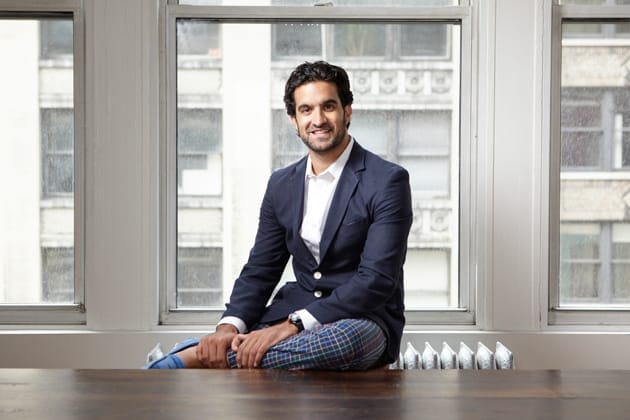It seems appropriate that I’m writing this post from Edinburgh, Scotland at TED Global. Edinburgh is, after all, one of the birthplaces of capitalism. Adam Smith, author of The Wealth of Nations, and other prominent figures were born here.
First, a little bias: I’m a very risk-averse entrepreneur, as a result of bootstrapping my first three businesses, almost failing on the fourth, (Coremetrics) due to market timing and overcapitalization, and being mostly customer funded and very capital efficient on the fifth (Bazaarvoice). I’m also a product of bootstrapped entrepreneurs, my parents, who took little risk. I saw them go through the inevitable ups and downs in business, and the humbling experience of earning a living through entrepreneurship.
The first post was sent to me by Josh McClure, the co-founder and CEO of Real Massive, who I referenced in my Lucky7 post about Lola Savannah. You would be wise to read and internalize this PandoDaily post about “startup drugs” by Andy Dunn, co-founder and CEO of Bonobos. It is about the damning nature of an overcapitalized business. I saw this story in Silicon Valley, where I lived for four years, play out over and over again, especially at the apex of the dot-com boom. Here is one of my favorite excerpts:
“Prior to a lobotomy I just underwent which removed shiny new object syndrome (SNOS) from my brain, I was both an asset and a threat to my own company. The company is trying to do one thing, and I would come up with another. I can’t tell you how dangerous this is. If the founder doesn’t know what the company is doing, the company won’t either.”
I lived this at one of my startups, Coremetrics. I had six projects going at once. This drove nearly everyone in the company crazy and our foundational product—the Web analytics that we eventually became known for—was failing. I realized that nothing would matter if we didn’t get the core of Coremetrics fixed, and fast. I flew to Austin to spend the month with the R&D team where I immediately killed extraneous projects.
The second post, by Malcolm Gladwell, was sent to me by Mitchell Green, the founder and CEO of Lead Edge Capital, who led our last round of funding at Bazaarvoice prior to the initial public offering. Gladwell’s post is about the risk-averse nature of successful entrepreneurs, and was initially an article in The New Yorker titled “The Sure Thing.” Again, an excerpt:
 “The economist Scott Shane, in his book The Illusions of Entrepreneurship, makes a similar argument. Yes, he says, many entrepreneurs take plenty of risks—but those are generally the failed entrepreneurs, not the success stories. The failures violate all kinds of established principles of new-business formation. New-business success is clearly correlated with the size of initial capitalization. But failed entrepreneurs tend to be wildly undercapitalized. The data show that organizing as a corporation is best. But failed entrepreneurs tend to organize as sole proprietorships. Writing a business plan is a must; failed entrepreneurs rarely take that step. Taking over an existing business is always the best bet; failed entrepreneurs prefer to start from scratch. Ninety per cent of the fastest-growing companies in the country sell to other businesses; failed entrepreneurs usually try selling to consumers, and, rather than serving customers that other businesses have missed, they chase the same people as their competitors do. The list goes on: they underemphasize marketing; they don’t understand the importance of financial controls; they try to compete on price. Shane concedes that some of these risks are unavoidable: would-be entrepreneurs take them because they have no choice. But a good many of these risks reflect a lack of preparation or foresight.”
“The economist Scott Shane, in his book The Illusions of Entrepreneurship, makes a similar argument. Yes, he says, many entrepreneurs take plenty of risks—but those are generally the failed entrepreneurs, not the success stories. The failures violate all kinds of established principles of new-business formation. New-business success is clearly correlated with the size of initial capitalization. But failed entrepreneurs tend to be wildly undercapitalized. The data show that organizing as a corporation is best. But failed entrepreneurs tend to organize as sole proprietorships. Writing a business plan is a must; failed entrepreneurs rarely take that step. Taking over an existing business is always the best bet; failed entrepreneurs prefer to start from scratch. Ninety per cent of the fastest-growing companies in the country sell to other businesses; failed entrepreneurs usually try selling to consumers, and, rather than serving customers that other businesses have missed, they chase the same people as their competitors do. The list goes on: they underemphasize marketing; they don’t understand the importance of financial controls; they try to compete on price. Shane concedes that some of these risks are unavoidable: would-be entrepreneurs take them because they have no choice. But a good many of these risks reflect a lack of preparation or foresight.”
Bazaarvoice and Coremetrics started from scratch, and I’ve angel-backed companies recently that have started from scratch. But I would argue for B2B software-as-a-service (SaaS ) businesses, if you really know the market and if you are sure clients will pay for your solution, you are not taking much risk. SaaS businesses are like an annuity and you should be able to presell and collect a good portion of cash up-front from your clients. In other words, as I write in my Lucky7 post on capital efficiency, you should be able to make your businesses mostly customer-funded.

























